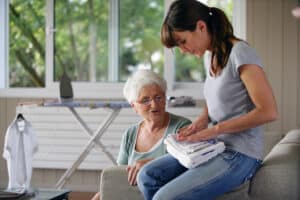
Preserving seniors’ freedom and standard of living becomes crucial as they age. However, the ability to perform tasks, such as daily living skills, might alter subtly as they age, indicating the need for additional support. The good news is that this support can come from companion care at home services, which allows seniors to remain in their homes where they’re most comfortable.
The Importance of Daily Living Skills
Daily living skills are a wide range of tasks required for self-sufficient functioning. These can include taking care of oneself, cooking, handling money, taking prescriptions as prescribed, cleaning, and traveling. These abilities frequently function as indicators of independence and vitality for seniors, which is why it’s essential for loved ones to assess seniors’ abilities to maintain these skills. Companion care at home caregivers can assist aging seniors with daily living skills to help them preserve independence.
Monitoring Daily Living Skills
Keeping an eye on everyday living abilities requires both direct observations—which can come from loved ones’ observations or companion care at home providers—and honest communication. When considering if seniors need more assistance with their daily living skills, consider the following:
- Physical Health: One’s physical well-being has a direct bearing on their ability to function in daily life. Loved ones should pay attention to any changes in seniors’ strength, endurance, and mobility. If it’s noticed that they start to struggle with carrying groceries, walking up stairs, or performing other activities, it might point to a need for more assistance.
- Cognitive Function: Deterioration in cognition can take many forms, impacting one’s capacity for memory, judgment, and problem-solving. Cognitive alterations may manifest as forgetfulness, difficulty performing normal tasks, or difficulty adhering to instructions.
- Emotional Well-Being: Mental health has a significant impact on day-to-day functioning. Seniors may display symptoms of social disengagement, anxiety, or sadness, which can affect their motivation and participation in everyday activities.
- Changes in Living Conditions: The living conditions of seniors might significantly impact their capacity to carry out daily chores. Loved ones and companion care at home workers should examine the home’s accessibility, organization, and safety risks. Adding grab bars, ramps, or adaptable equipment to a space can improve independence.
- Social Interaction: Emotional health and mental stimulation depend on social relationships. Diminished social interactions, disengagement from events, or disregard for personal hygiene could be signs of depression or social disconnection.
Technology’s Role in Senior Independence
As the loved one of a senior, you might wonder how you can monitor their everyday abilities. The good news is that technology could be part of the answer. The first step is to talk with seniors about the acceptance of these monitoring devices, focusing on your concern for their safety and wanting to help them remain in the home as much as possible. Some ideas that could be incorporated include the following:
- Wearable Technology: Fitness trackers and smartwatches may monitor vital signs, activity levels, and sleep patterns, providing important information about seniors’ general health and well-being. Companion care at home providers can ensure seniors are wearing their devices correctly and routinely.
- Home Sensors: Smart home technology devices can identify irregularities in everyday schedules, such as forgotten prescription dosages, strange behavior patterns, or falls, and instantly notify family members.
- Mobile Apps: A number of apps are available to help seniors keep track of appointments, manage their medication, and maintain relationships with family members. These applications can help with daily tasks by acting as reminders.
The goal of monitoring seniors’ daily life skills is to enable them to live satisfying lives with dignity and independence. By recognizing their need for more support, loved ones can work with companion care at home to ensure seniors are safe, well cared for, and have the assistance they need to complete their daily tasks.
If you or an aging loved one are considering Companion Care at Home in Palo Alto, CA, please contact the caring staff at Aviva In-Home Care today at (415) 463-1400
Aviva In-Home Care provides exceptional senior home care in the Bay Area, including San Francisco, Burlingame, San Mateo, Hillsborough, Atherton, Menlo Park, Palo Alto, Berkeley, Lafayette, Orinda, and surrounding areas.
Sources:
- https://parentishealth.com/assistance-adls/
- https://www.aarp.org/caregiving/home-care/info-2021/assessing-need-for-caregiver.html
- https://assistinghands.com/88/florida/westorange/blog/adls-iadls-senior-care/
- Exploring Resistance Training for Seniors - July 24, 2024
- The Benefits of Whole Grains for Seniors - July 16, 2024
- How To Keep Your Senior Parent From Getting Scammed - July 10, 2024


